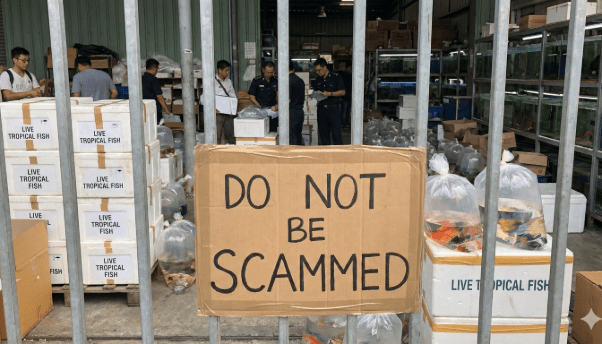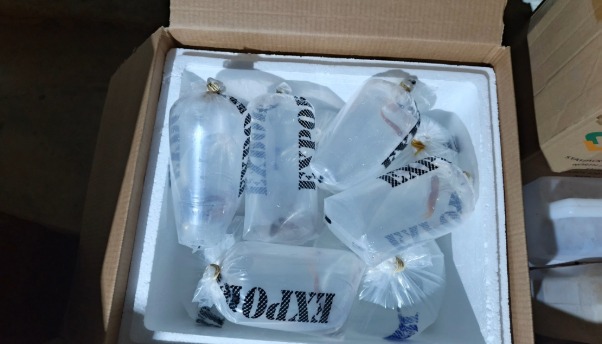Avoiding Fraudulent Ornamental Fish Exporters

If you’ve been in the aquarium business long enough, you know this truth: not all ornamental fish exporters are what they claim to be. Some are genuine professionals who care about quality, animal welfare, and long-term business partnerships. Others… well, let’s just say some “exporters” disappear the moment payment clears.
Whether you’re an aquarium store, wholesaler, or distributor, choosing the right ornamental fish exporter can make or break your business. Healthy fish mean happy customers, stronger margins, and fewer losses. A fraudulent supplier means dead stock, financial pain, and angry clients.
In this guide, we’ll dive deep into how to avoid fraudulent ornamental fish exporters, how to verify legitimate ones, and how to build reliable long-term partnerships with exporters who care about your success.
Understanding the Risk: Why Fraud Happens in Ornamental Fish Exporting
The ornamental fish industry is huge, dynamic, and global. Countries like Kenya, Indonesia, the Philippines, Sri Lanka, and Tanzania supply thousands of marine and freshwater species every year. With so many players and so many digital marketplaces, it’s no surprise that fake exporters slip into the system.
Fraud happens for three main reasons:
High demand and low regulation
Demand for marine fish keeps growing, especially among reef hobbyists and premium aquarium stores. Because there isn’t equal regulation across exporting regions, scammers can create fake companies and lure unsuspecting buyers.
International purchasing makes verification harder
When communication happens over WhatsApp, Facebook, or email, buyers often cannot physically see facilities or verify licenses. Fraudulent exporters exploit distance.
New buyers lack experience
New aquarium shop owners may not know how to assess export compliance, fish quality standards, or required certifications.
This is where a legitimate ornamental fish exporter becomes invaluable.
What a Trustworthy Ornamental Fish Exporter Looks Like
Before discussing red flags, let’s look at what a good exporter provides. Whether you’re considering an ornamental fish exporter in Kenya or anywhere else in Africa or Asia, the signs of a reputable supplier are consistent.
✔ A real export license and government registration
Legitimate exporters always have verifiable documentation. Kenya, for instance, requires registration with KMFRI, KWS, KEBS, and Customs.
✔ Clear photos, videos, and facility transparency
A real ornamental fish exporter is proud to show their holding systems, packing area, filtration setup, and livestock quality.
✔ Knowledgeable staff
A genuine exporter of ornamental fish knows species behavior, compatibility, collection ethics, acclimation procedures, and export regulations.
✔ Consistent communication
Real ornamental fish exporters don’t disappear for days. They’re responsive, detailed, and patient when answering questions.
✔ Professional packing standards
This includes oxygen-filled bags, proper water ratios, ammonia-neutralizing additives, heat or cold packs when needed, double-bagging, and Styrofoam-lined boxes.
✔ Customer references
Good exporters have long-term clients and those clients are happy to vouch for them.
If your exporter ticks these boxes, you’re already on the right track.
Red Flags: How to Spot Fraudulent Ornamental Fish Exporters
Unfortunately, scammers have become smarter. Some create fake facility photos, steal videos from legitimate exporters, or fabricate licenses. Here are the major warning signs.
🚩 1. No live videos or facility proof
If an exporter refuses to show:
- holding tanks
- filtration systems
- staff working
- fish being packed
- real-time video calls
…it’s likely a fraud.
🚩 2. Prices that are too good to be true
If everyone else sells a species for $8–$14 and someone offers it for $2, it’s not a “deal.” It’s bait.
🚩 3. They rush you to pay immediately
Fraudulent ornamental fish exporters use emotional pressure:
- “Only one shipment left!”
- “Pay now or someone else takes your order!”
- “We don’t reserve without payment!”
A trustworthy ornamental fish exporter explains timelines without pressuring you.
🚩 4. Payment methods that leave no trace
Be cautious if they insist on:
- mobile money with no registered company
- personal accounts
- cryptocurrency (unless this is your intentional payment method)
Legitimate exporters offer corporate payment options.
🚩 5. No export license or unverifiable documents
Some scammers send photoshopped permits. Always verify with relevant authorities.
The Verification Checklist: How to Confirm if an Ornamental Fish Exporter is Legit
Before you buy, confirm:
Their company registration
Ask for registration certificates and confirm with local government databases.
Their export license number
In Kenya, verify with:
- Kenya Wildlife Service (KWS)
- Kenya Marine & Fisheries Research Institute (KMFRI)
Facility video call
Request a quick 5–10 minute walk-through. Scammers will always refuse.
Packing demonstration
Ask them to show how they pack fish for shipping.
Customer references
Request contacts from existing buyers. If they refuse, walk away.
Species availability list
Legitimate exporters provide weekly updates, not generic lists found online.
Google Maps business listing
Fraudulent ornamental fish exporters rarely have a physical business location.
These steps alone can eliminate 90% of fraudulent exporters.

Working with Ornamental Fish Exporters in Africa: What to Expect
Africa is home to some of the most unique marine species in the world; especially Kenya, Tanzania, and South Africa. But Africa has become a hotspot for fraudulent sellers, making proper checks essential.
When working with a real ornamental fish exporter in Africa, expect:
- native species knowledge
- ethical collection methods
- export compliance
- consistent communication
- fair pricing
- transparent documentation
Reliable African ornamental fish exporters want long-term relationships, not quick cash.
The Value of Repeat Partnerships
Once you find a legitimate exporter of ornamental fish, treat that relationship like gold. Strong partnerships lead to:
- preferential pricing
- priority access to rare species
- smoother logistics
- faster resolution when issues arise
Most reputable ornamental fish exporters will happily help your aquarium shop grow, because your growth ensures theirs.
How Aquarium Shops Can Protect Themselves Long Term
Fraud prevention isn’t a one-time step; it’s a business practice. Here’s how to protect your store from long-term risk:
✔ Maintain a supplier database
Document each exporter you vet, contact details, licenses, and feedback.
✔ Start with small test shipments
Never start with a large order. Test their quality first.
✔ Ask for DOA policies
Legitimate exporters provide Dead-On-Arrival credit policies.
✔ Request updates during collection & packing
Real exporters share:
- collecting videos
- acclimation processes
- packing videos
- freight updates
✔ Keep communication on email as well
This creates a written record for safety.
Why Kenya Is Becoming a Preferred Source for Marine Ornamentals
Kenya’s ornamental fish sector is fast-growing because:
- species are hardy
- exporters follow stricter government rules
- Kenya’s coastline has diverse marine life
- export systems are improving
- ethical collection practices are promoted
A trustworthy ornamental fish exporter in Kenya can provide some of the most sought-after species globally.
Conclusion: A Good Ornamental Fish Exporter Is a Business Investment
A reputable ornamental fish exporter doesn’t just ship fish, they help you succeed. They want you to grow, reorder, expand, and trust them for years. That’s why verifying your exporter is not optional, it’s essential.
When you know how to spot scams, how to verify documents, and how to build strong partnerships, your aquarium store gains stability, confidence, and long-term profit.
